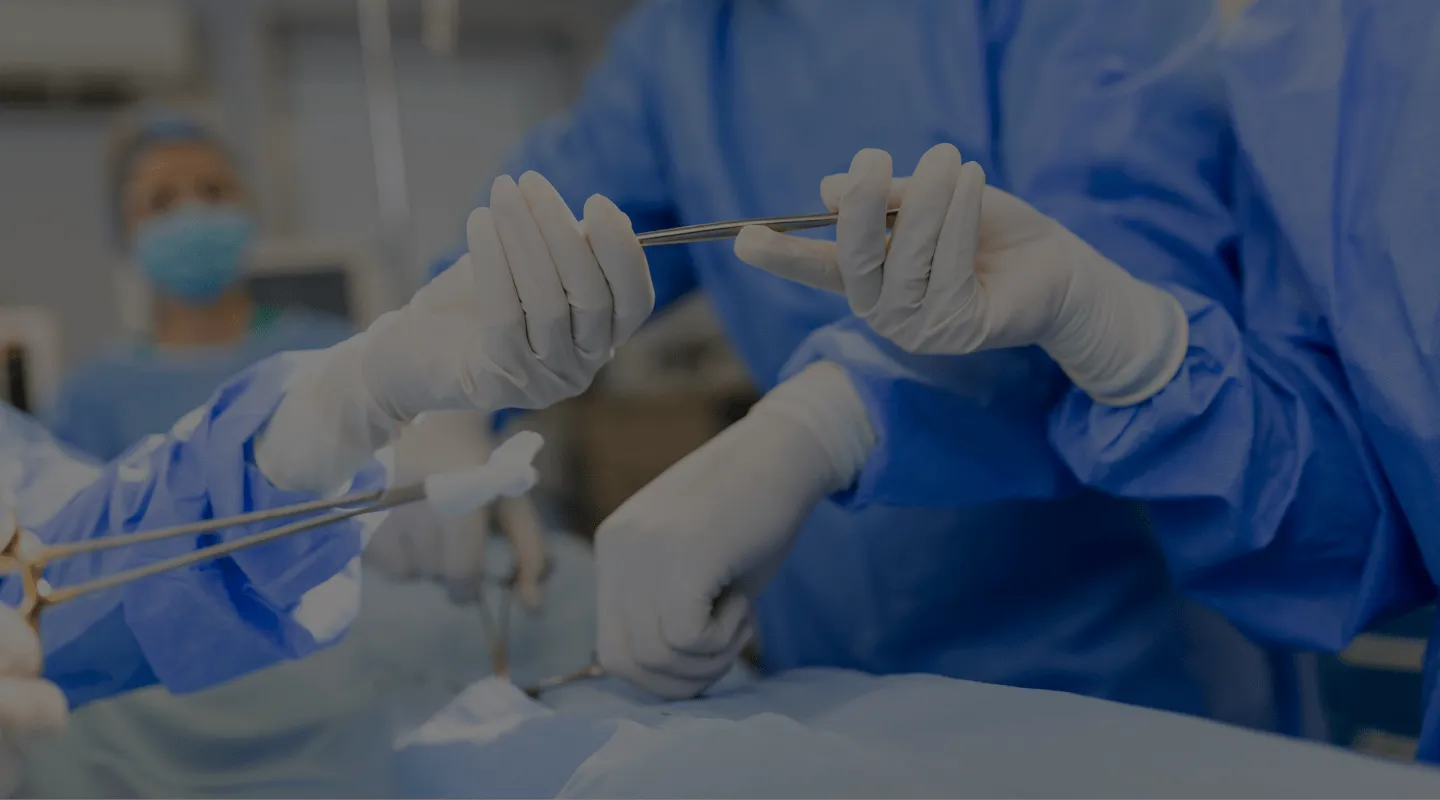
Oncological Surgery
Your Oncological Surgery in Tunisia at Affordable Prices
Opt for cancer surgery in a state-of-the-art medical environment, at a controlled price.
How does it work?
Oncological Surgery in Tunisia
Oncological surgery in Tunisia encompasses all surgical techniques aimed at treating and preventing cancerous diseases. This discipline relies on the use of numerous surgical techniques, tools, and modern technologies, depending on the type of cancer affecting the patient. In Tunisia, oncological surgery has made significant progress, and patients from all over the world are cared for by internationally renowned experts and welcomed into ultra-modern medical facilities. Here’s everything you need to know about oncological surgery in Tunisia.
What is Oncological Surgery in Tunisia?
When a patient is diagnosed with cancer, surgery may be considered to remove the tumor; this surgery is performed by a surgeon specializing in the organ affected by the cancerous disease (urologist, gastroenterologist, neurosurgeon…). To optimize the outcome of the surgery and minimize the risk of recurrence, the surgical intervention may be accompanied by another type of treatment. The chosen treatment will specifically eliminate any remaining cancer cells (treatment performed after surgery), or reduce the size of the tumor (treatment before surgery).
Here are some examples of treatments performed in Tunisia in addition to oncological surgery:
- Chemotherapy: chemotherapy treatment can be performed before or after surgery. This treatment involves taking different medications; the combination of medications to take will depend on the type of cancer being treated;
- Radiotherapy: this treatment uses ionizing radiation, which will be focused on the affected area of the body. The goal of this treatment is to eliminate cancer cells;
- Immunological treatment: this treatment, administered intravenously, aims to stimulate the patient’s immune defenses so that the natural immunity can identify and eliminate cancer cells present in the body;
Price of Oncological Surgery in Tunisia
Tunisia Destination Santé can support you throughout your treatment with a multidisciplinary oncology team. If you wish to organize your care protocol with our organization or undergo oncological surgery only, please contact us to request a detailed quote. We can offer you the medical intervention alone or organize your stay in Tunisia, ensuring comprehensive care from the moment you arrive.
Your health, our priority.
Request your free quote.
Oncological Surgery in Tunisia: What to Know Before the Operation
Before undergoing oncological surgery in Tunisia, you will need to compile a complete medical file, including the various documents, prescriptions, medical images, and analyses required depending on the type of cancer and the organ concerned (mammography, lung X-ray, colonoscopy…). During the initial consultation with the surgeon, they will explain the surgical procedures, their objectives, and which type of treatment is best suited to you. The surgeon may request additional examinations to make a more precise diagnosis. Depending on your situation, the surgeon may recommend radiotherapy or chemotherapy treatments in conjunction with the surgery.
Since the operation will be performed under general anesthesia, a meeting with the anesthesiologist will be scheduled to verify that you can tolerate the anesthesia. You should inform the anesthesiologist of any health problems, particularly if you have allergies or cardiovascular diseases. You should provide your surgeon and anesthesiologist with a list of the medications you are taking, indicate if you are taking anticoagulants, or if you smoke. A few weeks before the operation, you should stop smoking and avoid taking aspirin or anticoagulants to reduce the risk of complications.
How Does Oncological Surgery in Tunisia Proceed?
The procedure is performed under general anesthesia; the number of hours required will depend on several factors, such as the complexity of the intervention, the size of the tumor, and its location. The intervention will be performed by a specialist in the relevant field.
In the context of oncological surgery, different types of interventions can be performed, each procedure having a different objective:
- Curative surgery: this is performed to eliminate a localized tumor, diagnosed at an early stage. The tumor, partially or totally removed, can then be analyzed in a laboratory to confirm the diagnosis and assess the tumor’s potential for progression;
- Tumor reduction surgery: as its name suggests, this intervention aims to reduce the size of the tumor as much as possible, before moving on to chemotherapy or radiotherapy;
- Prophylactic surgery: this intervention is performed as a preventive measure to prevent the appearance of cancer in an organ;
- Lymph node dissection: this intervention aims to remove the lymph nodes, which will then be analyzed to see if there are any tumors;
- Metastasis surgery: metastases are secondary tumors that develop following the appearance of the primary tumor. This surgery will remove the metastasis or metastases that have appeared in the body;
- Repair and reconstructive surgery: this procedure aims to reconstruct the damaged part of the body or organ that has suffered sequelae following treatment. Example: breast reconstruction after removal;
Our advantages


What are the After-effects of Oncological Surgery?
Once the operation is completed, the patient will remain under medical supervision for a few days at the clinic. The oncological surgeon can thus check the patient’s general health and the progress of the treatment. The removed tumor will be sent to the laboratory for analysis by the histopathology department. The analyses performed will have several objectives, including verification of the status of the lymph nodes around the tumor. If these lymph nodes are healthy, then it will be possible to ensure that the tumor has been completely removed. Thus, thanks to the conclusions drawn from these analyses, it will be possible to determine whether the patient needs chemotherapy after the operation or not. Chemotherapy will serve in this case to eliminate the remaining cancer cells.
Contact and Quote Request for Oncological Surgery
If you want to organize your oncological surgery abroad and wish to organize your stay in Tunisia with a serious and experienced agency, trust the professionals of Tunisia Destination Santé. We will assist you step by step in preparing your file and organizing your stay. Our team is at your disposal to assist and guide you through all the procedures. Feel free to contact us for more information and to request a free, no-obligation quote.
—
Frequently Asked Questions
Criteria include the stage of cancer, tumor location, patient’s overall health, and the likelihood that surgery will completely eliminate the cancer. The patient’s medical history and personal preferences also play a role.
It is often combined with other treatments such as radiotherapy, chemotherapy, and immunotherapy. Multidisciplinary teams discuss each case to determine the best course of action, involving surgeons, oncologists, and radiologists.
Risks include complications related to the precision required to remove the tumor without damaging healthy tissue, infections, bleeding, and effects on the function of the affected organs. The risk of cancer recurrence is also an important consideration.
Robotic surgery offers increased precision, smaller incisions, and faster recovery. This can improve survival rates, reduce postoperative complications, and allow more complex interventions in difficult-to-reach areas.
Challenges include managing rapidly growing tumors, preserving healthy tissue to allow normal growth, and the emotional and psychological impact on young patients and their families.
In some cases, surgery can be used to remove isolated metastases or reduce the tumor burden to improve the effectiveness of other treatments. The decision depends on the location of the metastases and the patient’s general condition.
Options include plastic and reconstructive surgery, such as skin grafts, flap reconstructions, and the use of prostheses. The choice depends on the location of the tumor and the patient’s preferences.
Quality of life can be affected by physical changes, such as scars or loss of function, as well as emotional impacts. Follow-up and psychological support are essential to help patients adapt.
Surgical margins are crucial to ensure complete cancer removal. Negative margins (absence of cancer cells) reduce the risk of recurrence, while positive margins may require additional treatments or secondary surgery.
Preparation includes consultations with specialists, discussions about expectations and risks, a balanced diet, smoking cessation, and appropriate exercise. Psychological support and support groups can also help manage anxiety and emotions.
